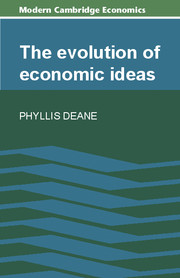Book contents
- Frontmatter
- Series preface
- Contents
- Introduction
- 1 Origins of modern economics
- 2 Adam Smith's theory of value
- 3 Origins of modern growth theory
- 4 Classical monetary theory
- 5 Ricardo on value, distribution and growth
- 6 Scope and methodology of classical political economy
- 7 The marginal revolution and the neo-classical triumph
- 8 The neo-classical theory of value
- 9 The Marxian alternative
- 10 Neo-classical orthodoxy in the inter-war period
- 11 Monetary theory in the neo-classical era
- 12 The Keynesian revolution
- 13 Twentieth-century growth theory
- 14 Methodological divisions in economics since Keynes
- Index of names
- Subject index
12 - The Keynesian revolution
Published online by Cambridge University Press: 05 June 2012
- Frontmatter
- Series preface
- Contents
- Introduction
- 1 Origins of modern economics
- 2 Adam Smith's theory of value
- 3 Origins of modern growth theory
- 4 Classical monetary theory
- 5 Ricardo on value, distribution and growth
- 6 Scope and methodology of classical political economy
- 7 The marginal revolution and the neo-classical triumph
- 8 The neo-classical theory of value
- 9 The Marxian alternative
- 10 Neo-classical orthodoxy in the inter-war period
- 11 Monetary theory in the neo-classical era
- 12 The Keynesian revolution
- 13 Twentieth-century growth theory
- 14 Methodological divisions in economics since Keynes
- Index of names
- Subject index
Summary
The academic community of economists had by the early 1930s reached a sufficient disciplinary solidarity in their commitment to marginal analysis, and the associated analytical techniques, to provide the learned journals with a steady flow of articles that were often incomprehensible to the laymen, and sometimes too abstract either for the increasing body of empirical researchers, or for the broad fringe of economics graduates who continued to provide professional advice and explanation in their capacities as journalists, politicians, bankers, governmentofficials, etc. Nevertheless, the common objective of the purest of theorists was still to provide a framework for the explanations or predictions that could assist policy makers to formulate rational economic policies. The fact is that the problems which professional economists have accepted as important have never been defined exclusively by an academic community. When economic science fails effectively to focus on the problems which society at large regards as important, all practising economists are vulnerable to the sense of intellectual insecurity that spreads through the rank and file of the profession.
In the 1930s the problem that dominated the mature capitalist economies was the problem of intense, persistent, trade depression, associated with widespread, unprecedentedly heavy unemployment. The unemployment problem was already chronic in Britain and some other Western European countries in the 1920s. By the 1930s it was universal in capitalist economies; and it was aggravated rather than relieved by laissez-faire economic policies. Even Britain, the last stronghold of free trade, adopted a protectionist strategy in the 1930s.
- Type
- Chapter
- Information
- The Evolution of Economic Ideas , pp. 175 - 189Publisher: Cambridge University PressPrint publication year: 1978

